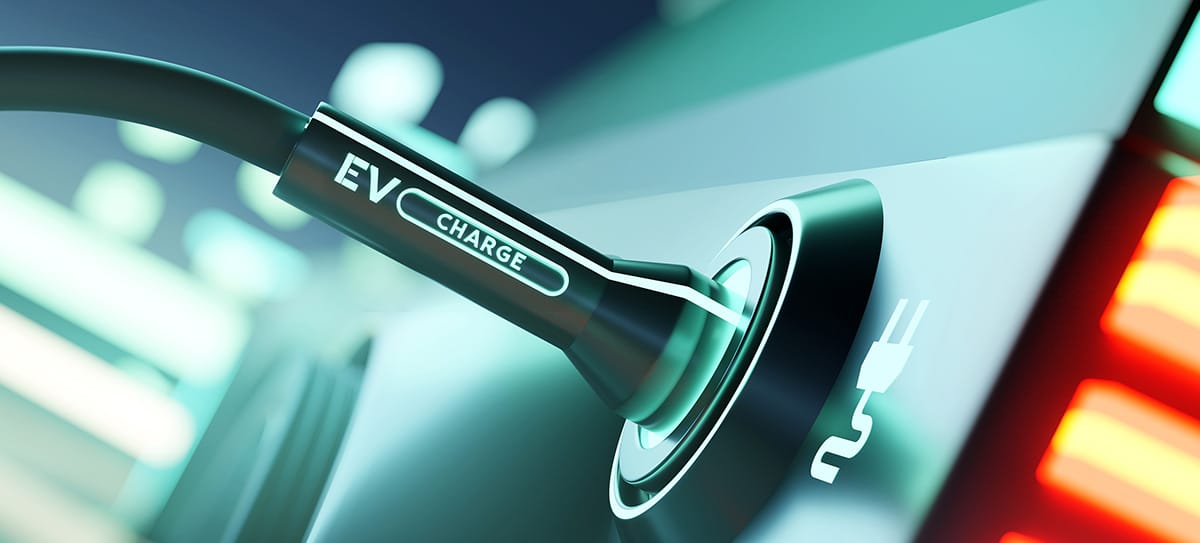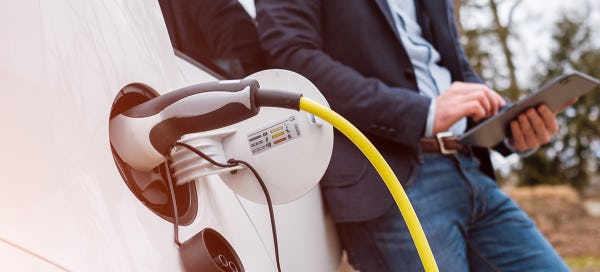Cars are changing as the transportation industry embraces electrification. Moving from gas to electric cars means shifting from filling up the tank at a gas station to recharging the battery with a charging station. So, it is no surprise that one of the top questions asked by potential EV drivers is — how much does it cost to charge an electric vehicle?
That answer depends on electricity rates and the type of charger used to power up your EV. We break it down below.
Fuel Economy for Electric Vehicles
We are all familiar with the fuel economy metric for gas-powered cars — miles per gallon (mpg). Since electric vehicles don’t have a gas tank, that mpg metric does not apply. Instead, the efficiency of electric vehicles is measured in kilowatt-hours per 100 miles (kWh/100 miles). That metric will be posted on the EV’s EPA fuel economy sticker as well as in the car’s user manual.
To get a comprehensive comparison of electric vehicle fuel economies, you can check out the Department of Energy website listings for battery electric vehicles and for plug-in hybrid electric vehicles. You can also visit our Electric Vehicle Hub to compare new and used EV makes and models.
How Much You Pay for Electricity
While there are public charging stations that offer free charging, most electric vehicle owners will install a Level 2 Charging Station at home. This enables owners to recharge their vehicle overnight (or any time of day) so that it’s ready for travel the next morning. Determining the cost to charge an electric vehicle requires an understanding of electricity rates and plans. Some plans operate under a time-of-use (TOU) model whereas other plans take a baseline approach.
A TOU rate plan has fluctuating electricity rates throughout the day. Customers pay more for electricity during peak-demand hours, typically late afternoon to early evening; customers pay less for electricity during periods of low demand, such as in the dead of night. So, if you have a TOU plan, then the time of day when you charge your EV impacts the cost.
Under a baseline model, customers pay a flat rate for electricity.
Although electricity rates differ from state-to-state, provider-to-provider, and plan-to-plan, the 2021 national electricity rate is 10.4 cents per kWh. We will use that 10.4 cents mark to show how to calculate the cost to charge an electric vehicle.
To learn more about electric vehicle charging visit our blogs:
Calculating Cost to Charge EV at Home
You can charge your vehicle using the 120-volt compatible charger that comes with your vehicle, but that will only trickle power into your vehicle’s battery and take up to 20 hours (or longer) to reach a full charge. This type of charging is best suited for emergency situations. Most EV drivers install residential Level 2 Chargers, formally known as Electric Vehicle Supply Equipment (EVSE), to more efficiently charge their EV.
To calculate the cost of fully charging a depleted EV with a Level 2 Charger, you need to know three things:
The cost of electricity
The EV onboard charger capacity (kW)
The EV battery pack size (kWh)
For our calculations, we will assume the national average electricity cost of 10.4 cents. Your electricity rate may be different, so to determine the rate to use in your calculation, simply review your electricity bill and divide the bill’s total dollar amount by your total kWh consumption. Another assumption we will make in our calculation is that the EV charger is capable of optimizing the electric vehicle’s onboard charger.
As an example, let’s calculate the approximate cost to charge the Hyundai Kona Electric.
The Hyundai Kona Electric has a 64 kWh battery pack and a 7.2 kW onboard charger. Assuming the cost of electricity is 10.4 cents/kWh, our calculation looks like this…
Cost per hour of charging — Multiply the cost of electricity by the EV onboard charging capacity. For our Hyundai Kona Electric, that calculation is:
$0.104/kWh x 7.2 kW = $0.75 per hour of charging
Estimate time to completely charge the vehicle — Divide the EV battery pack size by the onboard charger capacity. For the Hyundai Kona Electric, the calculation is:
64 kWh / 7.2kW = 8.9 hours to full charge
Cost for complete charge — Multiply the cost per hour of charging by the amount of time needed to complete a full charge. For the Hyundai Kona Electric, we have:
$0.75 cents per hour x 8.9 hours = $6.70 for complete charge
This quick calculation can be done for any other electric vehicle. To find out your EV’s onboard charger and battery pack capacity, consult the car’s user manual.
Drivers also have the option of using public EV charging stations. These stations can be free, subscription based, or pay-as-you-go. Some shopping centers install free charging stations to encourage customers to stay longer. Some business centers install them as a perk for employees. While it’s nice to know the free services available in your area, at-home charging provides great convenience and is more economical than using service based public charging stations.
Cost Of Charging an EV vs. Filling Up a Gas Tank
So how does the cost of charging an EV compare to fueling up at a gas station? Answering this question depends on the relative costs of electricity and gas in your area. When we look at national averages, we see that it is more cost effective to charge an EV than to fill up a gas-powered car. You can compare the cost of ownership for gasoline powered cars and electric vehicles on our website.
Looking again at the 2021 Hyundai Kona, we see that the gas-powered model has a 13.2 gallon tank. Taking the national average gas price (as of November 15, 2021) of $3.40/gallon, it would cost $44.88 to fill up the tank. With a fuel economy of 30 mpg (28 city / 32 highway), the Hyundai Kona delivers a driving range of roughly 396 miles on a full tank.
In comparison, the 2021 Hyundai Kona Electric has a driving range of 258 miles and costs only $6.70 for a full charge.
So, over the span of 1,000 miles, it would cost roughly $113 to fuel a gas-powered Hyundai Kona and only $26 to charge the Hyundai Kona Electric.
Cost To Install a Level 2 Charger
Level 2 Chargers utilize a 240-volt outlet. This may require professional installation to assure that the circuit is in line with code and receives enough amperage to fuel your charging needs.
Level 2 Charger equipment ranges from $500 to $2,200. High-end chargers often come with ‘smart’ features that allow drivers to track charging patterns and monitor energy flow. If that sort of data measurement is of interest, then it could be well worth the extra money. If you are looking for charging equipment without bells and whistles, there are many options toward the lower end of this price range that will satisfy your needs.
Level 2 Charger installation costs can range from $1,200 to $3,300. These costs depend on the extent of electrical work needed to safely supply sufficient amperage and voltage to the outlet used for EV charging. The distance from the circuit breaker to the outlet also factors into the cost of the electrical work.
In total, purchasing and installing an EV charger can cost anywhere from $500 to $5,500.
How You Get Your Electricity
Growing popularity for electric vehicles is part of the larger movement of electrification. More and more people are looking at what appliances and cars they’re using and how they are powering those devices.
A residential solar system can lower your levelized cost of electricity. Solar energy systems provide a great opportunity for homeowners to generate electricity directly from the sun and lock in the bulk of their energy supply for the next 25-30 years. It may be of interest to see if solar energy makes sense for your home.
This can be an appealing arrangement for EV owners. As they electrify their lives and consume more electricity, they can rest easily knowing that their electricity is coming from the most economic source available.
Whether or not you install solar, you will likely want to know that your EV is powered by clean energy. Choosing an electricity plan that matches your clean energy lifestyle is a sure way to boost your impact and reduce the overall emissions associated with your vehicle (as well as your other electrical devices and appliances). At Rhythm Energy, we offer Texas electricity plans specifically for EV owners. Check out our EV plans today!



